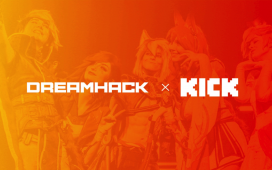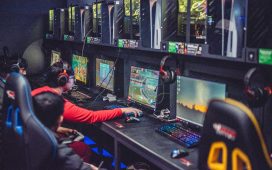Mentioned in this article
Secretlab ![]() became a prominent gaming chair manufacturer via a steady international rollout and key partnerships with esports teams, events, and pop culture licenses. However, the original formation of the company couldn’t have been more straightforward: the founders wanted something, couldn’t find it in the marketplace, and thus decided to make it themselves.
became a prominent gaming chair manufacturer via a steady international rollout and key partnerships with esports teams, events, and pop culture licenses. However, the original formation of the company couldn’t have been more straightforward: the founders wanted something, couldn’t find it in the marketplace, and thus decided to make it themselves.
Co-founder Ian Alexander Ang now leads Secretlab as its CEO, but he’s still drawing from lessons learned while playing StarCraft II ![]() and World of Warcraft
and World of Warcraft ![]() . He also believes that there is a link between the focus required to thrive as a competitive gamer and the ability to succeed in other industries and endeavors. Ang spoke to The Esports Observer about the formation of Secretlab and the gaming takeaways that stick with him today as a business leader.
. He also believes that there is a link between the focus required to thrive as a competitive gamer and the ability to succeed in other industries and endeavors. Ang spoke to The Esports Observer about the formation of Secretlab and the gaming takeaways that stick with him today as a business leader.
Filling a Void
Getting into esports as a career didn’t seem like a real possibility when Ang was still studying marketing in college in Singapore. He had completed a brief product evangelist internship at Razer ![]() in 2011, but didn’t see real opportunity to enter the industry later during his studies.
in 2011, but didn’t see real opportunity to enter the industry later during his studies.
“Back in 2014, I hadn’t really thought of what my next path was at that point. I did think that I was probably not going to do something esports or gaming-related. The esports industry definitely wasn’t as developed back then,” he said. “If you wanted to have a career in esports—especially in Singapore—you’d probably have to move to Korea or the United States to join a team house, and explore something like that. Back then, I would say I was probably moving more towards a traditional career path.”
“Green as we were, we put in a ton of effort and a lot of sweat to get everything done and designed.”
As mentioned, however, Ang sort of stumbled into his career as the co-founder and CEO of Secretlab… or sat into it, rather. After renovating his home and assembling a new gaming setup, he wanted a chair to match—and typical office chairs weren’t supportive enough for his needs.
“I realized that because I was sitting on just an ordinary chair, I had back pain, wrist pain, and all those kinds of things that come from gaming without proper ergonomic support for long hours,” he said. “I had a look for options, and the options out there just weren’t that great. That’s basically how everything started. I just couldn’t find a chair that could suit my needs, at least in Singapore. There were other international brands out there, but they were either too expensive or the quality wasn’t up to my standards.”
Ang had met co-founder Alaric Choo while playing StarCraft II semi-professionally, and said that Choo—a very hands-on, crafty person according to Ang—had encountered the same kind of need for a comfortable, supportive chair for gaming. Analyzing the opportunity, the two felt that there was a wider market that they could satisfy by creating such chairs themselves.

Pictured: Ang (right) with co-founder Alaric Choo (left)
“We talked and after doing research, we felt that this lack in the gaming product market needed to be addressed, and we felt like we had a chance of doing it,” said Ang. “Green as we were, we put in a ton of effort and a lot of sweat to get everything done and designed. We sought a lot of external help for this for the design part initially. One thing led to another, and we launched in Singapore.”
The initial run sold out within the first week and the company was immediately profitable. The founders’ hunch about filling that void in the market was affirmed. His family was against it at the time, but Ang decided to drop out of college to focus on his budding enterprise. He doesn’t put much stock in the idea of the college-dropout-turned-business-mogul, however, and said that he would have stayed in school had Secretlab not taken off right away.
“That’s when I realized that I had something golden, and I should not let up on this opportunity. That’s when I decided to quit university to focus on this,” he said. “There’s this overblown thing about Bill Gates dropping out of university, and Steve Jobs didn’t have a university degree. That kind of fairytale story is overblown. In my case, I got extremely lucky that there were results to show for it.”
A Gaming and Esports Education
Ang’s experience as a semi-pro esports competitor and avid gaming fan directly led to the formation of Secretlab, but he sees an even stronger connection than that. He believes that the kind of lessons he learned from playing games—from number-crunching in World of Warcraft to focused training in StarCraft II—helped enable his real-world business success.
“A lot of the games that I played early on in my life, I can only connect the dots backwards now to see how much gaming experience helped me,” he said. “Early on, when I was playing MMOs like RuneScape and World of Warcraft…I didn’t realize it back then, but when you’re 13-14 years old and you’re being exposed to trading, you get to learn about economics, cost accounting, and stuff like organizational structures. I don’t think anyone at 14 years old would’ve had exposure to these kinds of interactions otherwise. I think that I can only really appreciate the lessons that I’ve learned right now.”
Ang pointed to a recent Kotaku article about an EVE Online player who applied the lessons he learned in the notoriously hardcore space MMO to a real-life business, and who claimed in the piece, “If you’re playing EVE Online, you basically already have an MBA.” That’s hyperbolic, certainly, but the message still resonates with Ang—he said that the economic fundamentals learned in online games help with startup accounting at Secretlab.
Related Article: ReadyUp CEO Roderick Alemania on His Return to Esports
“You’re most curious when you’re young and you absorb information easier. When it comes to numbers, having pored through countless spreadsheets detailing probability and profitability, really made me sharper and quicker to get to the bottom of numbers and financial statements in real life,” said Ang. “So when it comes to startup accounting, oftentimes for us at Secretlab, we are a numbers and data-driven business. We rely on cost analysis.”
“I really find a lot of similarities between games I played,” he continued, “and when it comes to accounting and finance, it feels like I’ve really done it before. Truly, there are a lot of parallels.”
He also believes that his focus on competitive StarCraft II play helped hone some of his business skills. Ang talked about the need for deliberate training, and prioritizing focused practice and repetition to improve skills rather than just trying to have fun. Drawing a parallel to tennis, he said that it’s not about just hitting the ball in tennis, but learning how to hit it effectively and in specific, controlled ways. Honing that skill may not always be fun, but it’s essential.

Credit: Blizzard Entertainment
“[StarCraft II] was my first real-time strategy game, and it was the first game that I decided to play really seriously. I had a ton of learning lessons from that, more to do with personal growth,” he said. “It was more about shaping myself to be more self-aware, to be more critical, and I think that it also developed a lot of discipline. From StarCraft II, I think I learned a lot about deliberate training… to achieve great things, you really have to be doing things that most people don’t like to do.”
I could’ve started out and done a regular job and climbed the corporate ladder, but at that point in time, my career hadn’t started yet.”
Beyond his own experience applying gaming and esports skills to business, Ang said that friends and colleagues have also put that kind of training and technique to use as entrepreneurs. He’s convinced that there’s a connection between the two. “A lot of the serious gamers around me, some of them in Singapore at least, they have gone on to be successful entrepreneurs, as well,” he said. “There’s definitely some sort of link between competitive gaming and being able to be successful in your career.”
Risk and Reward
There’s one more gaming lesson that Ang applied to Secretlab, and it has to do with strategy. Why did Ang jump full-time into Secretlab instead of completing his degree? For him, it was a matter of passion—but also being aware that he hadn’t yet started or committed to a career. In his mind, he didn’t have much to lose at that point in his life.
“In StarCraft, if you’re losing, then there’s nothing much to lose. You can go all-in and play riskier strategies. But if you are already winning, then there’s no need to play risky strategies. Just close out the game and play a less-risky strategy,” he said. “That was my thinking at that point, as well. I could’ve started out and done a regular job and climbed the corporate ladder, but at that point in time, my career hadn’t started yet. Addressing the lack of options in the gaming chair market was something that I felt very passionate about that at that point in time. I felt even if Secretlab didn’t become very successful, I would’ve been much happier doing it than doing a corporate job.”

Credit: Secretlab
“Millennials these days, we prefer to have a job that we feel fulfilled and happy working at. So when hiring staff and when coaching my own staff, that’s something that I constantly ask for,” he continued. “They have to be happy working here, which is why most of them are gamers. We work so much with the gaming industry. If someone is not happy being here, we would rather ask them to leave the company rather than treat this as just a 9-to-5 job where it’s a slog every single day. I think all of our staff are extremely dedicated and take pride in their jobs, and they are why Secretlab has become a success shipping to over 50 countries worldwide.”














